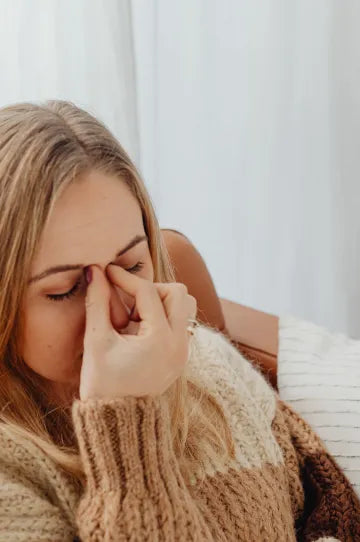




What are you looking for?

Best ayurvedic medicine for sinus allergy—learn gentle herbs, steam, neti, and diet tips that may reduce sneezing, congestion, and headache the natural way.
When sneezing, blocked nose, and heavy head keep returning, daily life feels tough. The good part? Ayurveda offers simple, home-friendly steps to calm irritated sinuses. In this guide, we explain the best ayurvedic medicine for sinus allergy, plus steam, neti, diet, and lifestyle tweaks that may help you breathe easier.
A sinus allergy is when your nose and sinus lining overreact to dust, pollen, smoke, or cold air. The lining swells. Mucus thickens. You sneeze, sniffle, and feel pressure around the eyes and cheeks. Triggers are different for everyone, but inflammation is the common link.

Below are time-tested options used traditionally. Choose what suits you, start low, and be consistent.
Tip: Start with one or two from above. Track your nose breathing on waking. Adjust slowly.

Many people notice that when digestion is heavy, sneezing and congestion worsen. Sluggish gut → more “ama” (toxic residue) → thicker mucus. A short, gentle stomach cleansing routine may support clearer breathing.
Consider Gut Reset for a simple digestive support protocol aligned with this approach.
is a reaction to triggers; sinusitis is inflammation/infection of sinus cavities. Ayurvedic care overlaps (steam, diet heat, herbs), but active infection needs medical evaluation. Red flags below.
Many people do well with a combo: tulsi-ginger tea, a small trikatu pinch after meals, and evening steam. For dryness, gentle nasya helps. Start low, track triggers, and adjust.
Use on calm mornings with sterile saline. Many prefer alternate days once symptoms settle. Stop if you feel burning, ear fullness, or have active infection.
Triphala doesn’t treat infection, but it may support gut cleansing and lighter mornings. Better digestion often means thinner mucus and fewer flares.
Cold drinks, ice cream, curd at night, deep-fried snacks, and very heavy dinners. Prefer warm soups, lightly spiced veggies, and ginger-tulsi tea.
Usually mild when used correctly. Spicy blends like trikatu may not suit ulcers or pregnancy. If you have chronic illness or take medicines, consult your clinician first.
Many notice easier breathing within 3–7 days with steam, neti, and warm diet. For stubborn cases, give 3–4 weeks of steady routine and seek medical advice if no relief.
If sinus allergy keeps returning, pair daily habits with guided herbal support. Amiy’s doctor-formulated approach focuses on Bio-Neuromodulation™ (helping nerves and nasal lining communicate calmly) and Complex Plant Elixir™ (synergistic botanicals like tulsi, turmeric, and warming spices).
You can also search for: Ayurvedic Medicine For Acidity And Gas | Ayurvedic Medicine For Acidity Safe Gas Relief | Ayurvedic Medicine For Allergy Relief Simple Steps | Ayurvedic Medicine For Anxiety And Stress Calm The Mind Sleep Better | Ayurvedic Medicine For Cholesterol Natural Control Guide | Ayurvedic Medicine For Constipation | Ayurvedic Medicine For Constipation Simple Relief | Ayurvedic Medicine For Dry Cough Natural Relief By Amiy Naturals | Ayurvedic Medicine For Headache Gentle Lasting Relief | Ayurvedic Medicine For Hormonal Imbalance Women S Guide | Ayurvedic Medicine For Hormonal Imbalance Women S Guide 1 | Ayurvedic Medicine For Inflammation And Pain Natural Relief | Ayurvedic Medicine For Irregular Periods Gentle Relief Balance | Ayurvedic Medicine For Joint Muscle Pain Simple Relief | Ayurvedic Medicine For Knee Pain Natural Relief Guide | Ayurvedic Medicine For Nerve Pain Natural Relief Guide | Ayurvedic Medicine For Pimples Clear Skin Naturally | Ayurvedic Medicine For Sleep Gentle Ways To Rest | Ayurvedic Medicine For Stomach Pain Gentle Relief | Ayurvedic Medicine For Weight Gain Safe Natural Ways | Ayurvedic Medicine Joint Muscle Pain | Ayurvedic Medicine Simple Guide To Natural Healing | Ayurvedic Solution For Stress Anxiety Amiy Naturals | Ayurvedic Syrup For Irregular Periods Gentle Cycle Support | Best Ayurvedic Health Supplements Amiy Naturals Online | Best Ayurvedic Medicine For Acidity And Gas | Best Ayurvedic Medicine For Blood Circulation Amiy Muscle Mercy 1 | Best Ayurvedic Medicine For Body Pain And Weakness Natural Relief | Best Ayurvedic Medicine For Gastric Problem Simple Relief | Best Ayurvedic Medicine For Insomnia Anxiety Amiy Naturals | Best Ayurvedic Medicine For Insomnia Anxiety Amiy Naturals 1 | Best Ayurvedic Medicine For Insomnia Sleep Drops By Amiy | Best Ayurvedic Medicine For Memory And Concentration | Best Ayurvedic Medicine For Migraine Gentle Relief | Best Ayurvedic Medicine For Neurological | Best Ayurvedic Medicine For Painful Menstruation Amiy Naturals | Best Ayurvedic Medicine For Skin Diseases Amiy Naturals | Best Ayurvedic Medicine For Snoring Problems Natural Relief | Best Ayurvedic Medicine For Stamina Energy | Best Ayurvedic Medicine For Stomach Cleansing Drops | Best Ayurvedic Medicine For Stomach Problems | Best Ayurvedic Medicine For Varicose Veins Relief | Best Ayurvedic Medicine For Women S Health Amiy Naturals Drops | Best Ayurvedic Medicine For Women S Health Amiy Naturals Drops 1 | Best Ayurvedic Oil For Muscle Pain Relief Safe Natural Support | Best Ayurvedic Products For Skin Herbal Medicine Onlin 1 | Best Ayurvedic Skin Care Products Clear Calm Glowing | Best Ayurvedic Skin Care Products Simple Picks For Clear Calm Skin | Best Ayurvedic Syrup For Glowing Clear Skin Amiy Naturals | Best Medicine For Nerve Pain In Neck Ayurvedic Guide | Buy Ashwagandha Ayurveda Drops Stress Relief Energy Boost | Buy Ayurvedic Blood Purifier Natural Herbal Drops For Healthy Blood | Buy Best Ayurvedic Medicine For Memory Concentration Amiy Naturals | Buy Best Ayurvedic Tonic For Glowing Skin Amiy Naturals | Top 10 Ayurvedic Herbs For Daily Use | Weight Loss Ayurvedic Medicine Safe Options For Women
